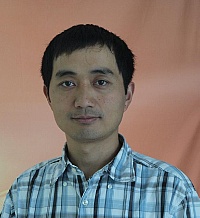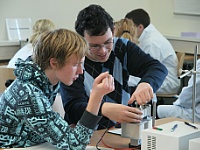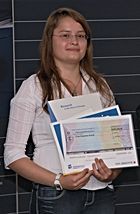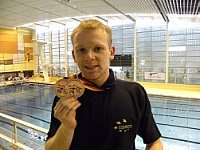Next Generation of Scientists - Annual Report 2010
 First Helmholtz Young Investigators’ Group
First Helmholtz Young Investigators’ Group
Last September, when the Helmholtz Association announced the names of the talented young scientists who would get support to set up their own junior research group, the joy was great for Dr. Shengqiang Zhou. Over the next five years, the HZDR researcher, who was born in China, will receive EUR 250,000 per year in order to continue his work. Since he earned his doctoral degree three years ago, he has been conducting research at the Institute of Ion Beam Physics and Materials Research where ions, i.e. charged particles, are used in materials science. These ions can change surfaces in such a way that innovative materials emerge with entirely new properties. Dr. Zhou is specifically interested in applications for the semiconductor and photovoltaics industries. He is researching functional semiconductor materials which might form the foundation for the computer chips of the future. Significantly higher process speeds and less energy consumption are expected when compared to today’s chips.
Together with the Helmholtz Young Investigators’ Group, the Helmholtz-Zentrum Dresden-Rossendorf has a total of seven junior research groups.
 Pilot Phase Started
Pilot Phase Started
Why does a graphite platelet float? What is the function of an oscillating circuit? How high is the resistance at low temperatures? Those who visit the new School Lab “DeltaX” at the Helmholtz-Zentrum Dresden-Rossendorf will find answers to these questions and can have a closer look at magnetism. Pupils have the opportunity of discovering the HZDR’s current research topics on their own with the help of experiments. “Here, children and adolescents can get a real hands-on experience and test their abilities as researchers and scientists,” notes the Head of the School Lab, Dr. Maria Hörhold.
The program of the School Lab initially addresses grades 10 through 12, but it will be expanded for lower grades in the upcoming years. Experiments revolving around optics and radioactivity are also on the agenda. The pilot phase started in December. Last year, Dr. Hörhold had submitted a successful application for start-up financing to the Helmholtz Initiative and Networking Fund. That is why the School Lab will now get 450,000 euros over the next three years. The money will be used, for example, to equip the facility with modern computers and instruments as well as finance the part-time position of a physics teacher and, as of 2012, also a chemist.
Interview: A Talent for Physics
With a school paper on the combustion behavior of fuels in nuclear reactors, Susanne Scholl from Dresden won one of the main prizes in the Saxon contest VON ARDENNE Physics Award 2010. The competition launched by the Helmholtz-Zentrum Dresden-Rossendorf in cooperation with the Saxon universities and supported by the VON ARDENNE Anlagentechnik GmbH corporation, the German Physical Society (DPG), and the Wilhelm and Else Heraeus Foundation was already held for the tenth time. Laureate Susanne Scholl, who is now studying technomathematics in Magdeburg, answered the following questions for us.
Ms. Scholl, how complex was your work? The practical part was very simple because I worked with a computer program. It was far more complex to familiarize myself with the topic and the program language. It took me a long time, but it was very interesting. I always enjoyed immersing myself into the topic again.
Would you recommend such school papers to others? I can highly recommend not only the scientific investigation of a physical topic but also specifically the work at the HZDR. Every day was exciting and insightful. I met a lot of very nice people, and I’m glad to have gotten the opportunity to carry out additional internships here.
Do you already know what you wish to do in your future career? I don’t have a concrete idea yet. At the moment, my plans only go as far as getting into a master’s program which I’ll probably pursue abroad. Let’s see how things develop after that.
 Higher, Faster, Farther: Apprentices on the Road to Success
Higher, Faster, Farther: Apprentices on the Road to Success
For all new apprentices who start their vocational training at the Helmholtz-Zentrum Dresden-Rossendorf, it should become quickly apparent that people have great expectations for their future careers. The best apprentices to be honored every year by the Chamber of Industry and Commerce (IHK) always include career beginners from the research center. During the past few years, some of them even managed to complete their education with the best results in all of Saxony or Germany. In order to achieve such success, these adolescents can count on the full support and the active commitment of their instructors. They not only train and educate their protégés in a superb professional manner, but also foster their overall personal development as well as strengthen and encourage them; thus, allowing these young adults to excel both at work and beyond.

